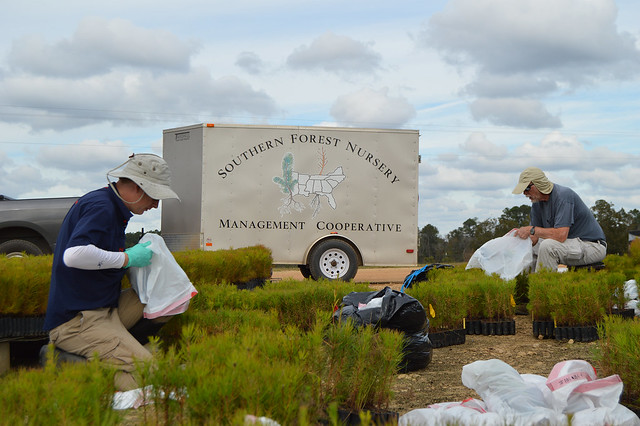Auburn forestry research helps lead to new product to reduce Southern pine seedling mortality
Article body
Auburn University research has helped lead to a new product to reduce Southern pine seedling mortality for the forestry industry.
“This is a major accomplishment that will allow forest tree nurseries to store their seedlings for longer time periods without detrimentally affecting the seedlings’ survival,” said Ryan Nadel, assistant research professor with Auburn’s School of Forestry and Wildlife Sciences.
The product from AgroFresh, trademarked as LandSpring, recently received EPA approval to include conifer seedlings after three years of testing by the Southern Forest Nursery Management Cooperative at Auburn.
The U.S. produces more than 1.2 billion forest tree seedlings for reforestation annually, with more than one billion produced in the Southeast. The majority of seedlings are conifers, produced as bareroot seedlings and grown in a similar manner to farming regular agricultural crops.
Seedlings are typically grown in native soil within open fields for about a year before they are removed from the soil during harvesting, or what is called lifting. They may be planted in areas that have been recently harvested or into fields, converting land back into forests.
Auburn research has shown the use of LandSpring increased the survival rate by 10 percent, which would potentially yield the growth of an additional 1.2 million pine seedlings after outplanting—the process of lifting, packing, storing and replanting—as compared to non-treated seedlings.
“Outplanting is stressful for seedlings, and storing forest tree seedlings is a foremost challenge for forest nursery managers due to the short time frame between lifting and planting,” Nadel said.
Lifting usually occurs between late November and late February, the optimum time period to avoid increased mold and decay of the seedlings and decreased survival once replanted. The seedlings are packed in boxes, bags or bundles and placed in cold storage for two to three weeks before being shipped to the field where they are replanted in areas prepared for reforestation throughout the Southeast.
“Weather conditions are not always optimal for planting the seedlings once harvested from the nursery, requiring seedlings to be stored for longer periods than recommended,” Nadel said.
The Auburn University Southern Forest Nursery Management Cooperative is a regional multisector member organization that serves to develop technologies for the economical production and utilization of forest tree seedlings in the southern U.S.
Related Media
Media interested in this story can contact Communications Director Preston Sparks at (334) 844-9999 or preston.sparks@auburn.edu.
The Auburn University College of Forestry, Wildlife and Environment is a flagship institution for natural resources-based degrees including natural resource management, geospatial and environmental informatics and sustainable biomaterials and packaging. The school serves as the backbone for Alabama’s $30 billion+ forest, wildlife and natural resources related enterprises. Its mission is to create next-generation professionals and leaders, to develop new knowledge and disseminate science-based solutions to our clientele to improve the social, economic and environmental well-being of citizens in Alabama and beyond.







